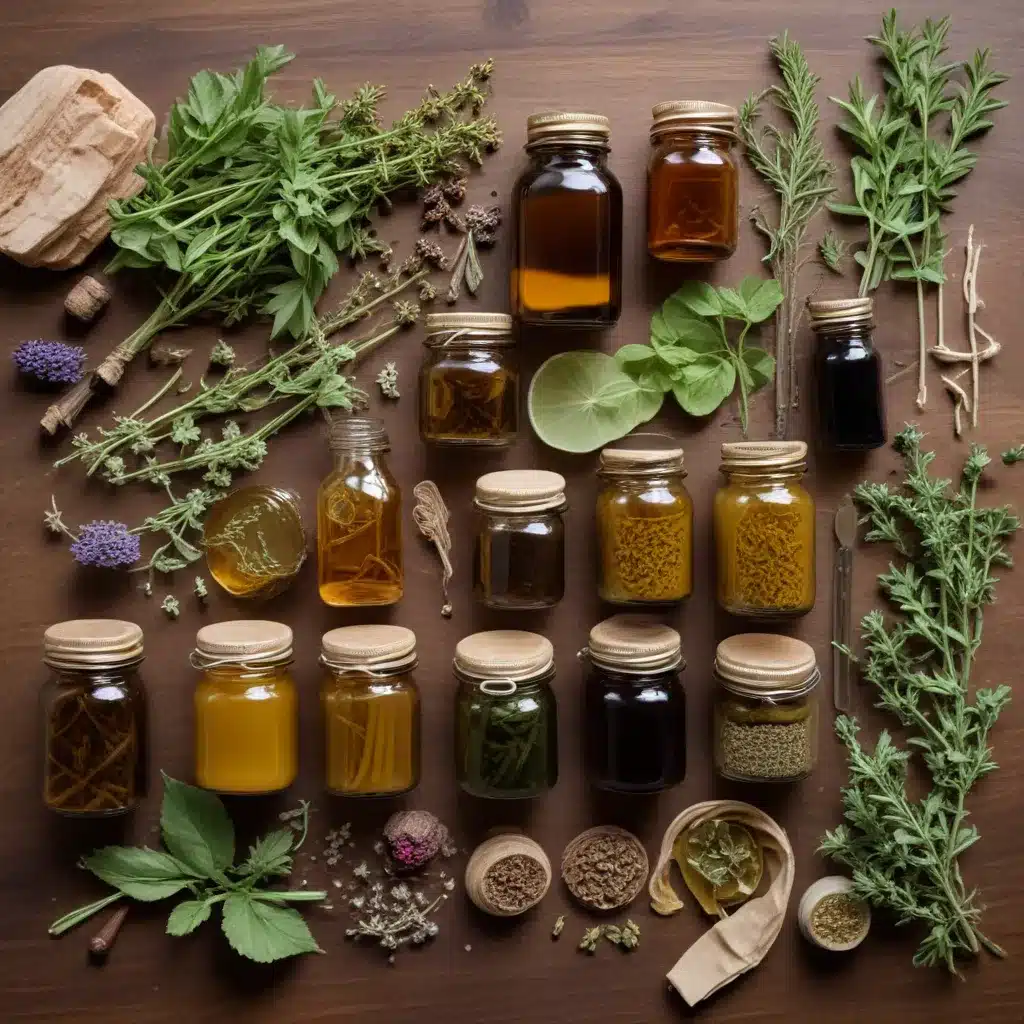
Herbal remedies offer a natural and sustainable way to support your family’s health, directly from the bounty of your own garden or local farm. At Crooked Pines Farm, we believe that with a little know-how, anyone can create effective tinctures, salves, and other herbal preparations right at home. In this guide, we’ll walk you through the core techniques and share our favorite homemade herbal remedy recipes.
Herbal Tinctures: Capturing the Essence
Tinctures are concentrated liquid extracts made by soaking herbs in alcohol. This extraction method is efficient at pulling out the beneficial compounds from plants, making tinctures a potent and shelf-stable way to harness herbal power.
To prepare a tincture, you’ll first need to select your plant material. The most common tincture ingredients are the leaves, roots, bark, or berries of medicinal herbs. Gather your chosen plant parts, chop them into small pieces, and place them in a clean glass jar. Cover the plant material with 80-100 proof alcohol, such as vodka or brandy, leaving about an inch of headspace.
Let the mixture macerate for 4-6 weeks, shaking the jar daily. The alcohol will gradually extract the active compounds from the herbs. After the infusion period, strain out the plant matter using a mesh strainer or cheesecloth, reserving the liquid. Transfer the tincture to a dropper bottle for easy dosing.
Tinctures can be used to address a wide range of health concerns, from supporting the immune system with echinacea to calming the nerves with skullcap. Start with small doses, like 10-20 drops in water or juice, and gradually increase as desired.
Soothing Herbal Salves and Balms
Herbal salves and balms are thick, ointment-like topical preparations made by infusing herbs into a fatty carrier, such as beeswax or shea butter. These versatile remedies are perfect for addressing skin issues, muscle aches, and other localized concerns.
To create a salve, you’ll first need to make an herbal-infused oil. Gently simmer chopped herbs in a carrier oil like olive, coconut, or almond oil for 2-4 hours, being careful not to overheat. Strain out the plant material, reserving the fragrant, potent oil.
Next, melt beeswax or shea butter in a double boiler and stir in the herbal oil. The beeswax will help thicken the mixture into a smooth, spreadable consistency. You can also add essential oils for extra therapeutic benefits and pleasing aromas.
Pour the salve into tins or jars and allow it to cool completely before use. Herbal salves are great for soothing dry, cracked skin, easing muscle tension, and even repelling pesky insects when enriched with citronella or peppermint essential oils.
Decoctions, Infusions, and Herbal Teas
Beyond tinctures and salves, you can also harness the power of herbs through hot-water extractions like decoctions and infusions. These preparations are excellent for addressing internal imbalances, as the hot water helps unlock the water-soluble compounds in the plants.
To make a decoction, simply simmer chopped roots, bark, or seeds in water for 20-30 minutes. For delicate leaves and flowers, an infusion is a gentler method – steep the plant material in hot water (just off the boil) for 5-15 minutes.
Strain the herbal liquid and enjoy as a therapeutic tea. You can also incorporate decoctions and infusions into other recipes, like soups, broths, or even homemade cough syrups. Get creative by blending complementary herbs, like ginger, turmeric, and orange peel for an immune-boosting tea.
Powders, Capsules, and Other Preparations
Beyond the liquid and topical forms, herbs can also be dried and transformed into powders or encapsulated for internal use. Drying plant material concentrates the active compounds, making powders and capsules a potent way to supplement with herbs.
To create herbal powders, thoroughly dry your plant material using a dehydrator or oven on the lowest setting. Once completely desiccated, use a spice grinder or mortar and pestle to grind the material into a fine powder. Store the powder in airtight containers away from light and moisture.
For capsules, simply fill vegetarian or gelatin capsules with your desired herbal powder. This method allows for precise, consistent dosing. Start with smaller amounts, like 300-500mg per capsule, and adjust as needed.
Herbal powders and capsules work well for things like immune-boosting elderberry, anti-inflammatory turmeric, or stress-relieving ashwagandha. Just be sure to research proper usage, as some herbs have contraindications or specific dosing requirements.
Oils, Vinegars, and Other Magical Elixirs
Herbs can be infused into a wide range of mediums beyond just alcohol and water. Oily, acidic, and fermented preparations each offer their own unique herbal benefits.
To make an herbal-infused oil, simply follow the same process as the salve method, simmering chopped herbs in a carrier oil like olive, coconut, or jojoba. The resulting oil can be used topically or taken internally in small doses.
Herbal vinegars are created by steeping herbs in raw, unfiltered apple cider vinegar. The vinegar extracts different compounds than alcohol, making vinegars great for addressing digestive issues or preparing salad dressings and marinades.
For a truly unique elixir, try your hand at brewing herbal meads. Ferment honey with your choice of fresh or dried herbs, spices, and fruits to create a nourishing, probiotic-rich beverage.
No matter which herbal preparations you choose to explore, remember to always research safety considerations, start with small doses, and consult your healthcare provider, especially if you have any medical conditions or take medications. With a little experimentation, you’ll be well on your way to crafting your own custom herbal remedies right at home.
To learn more about the wide world of herbs and natural wellness, be sure to visit us at Crooked Pines Farm! Our educational resources, seasonal events, and farm-fresh products can help you unlock the power of plants.


